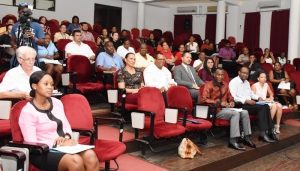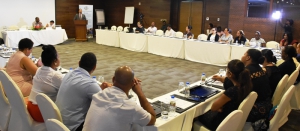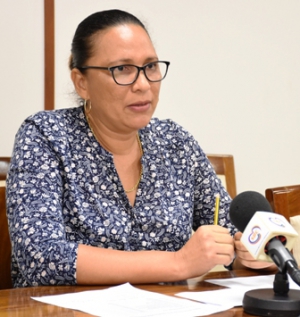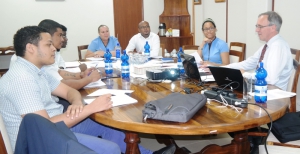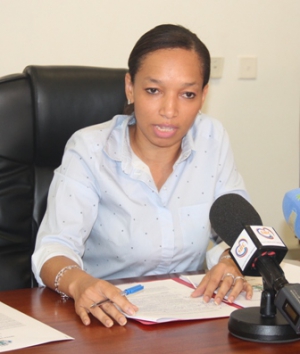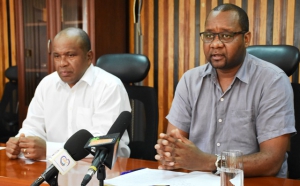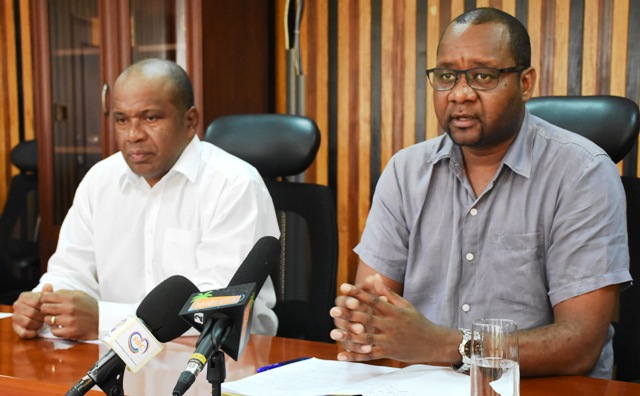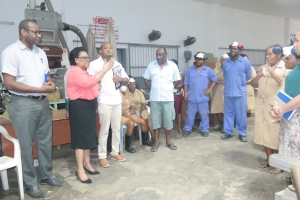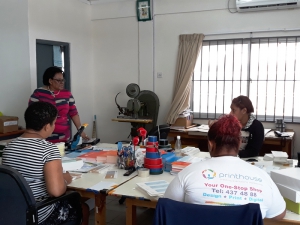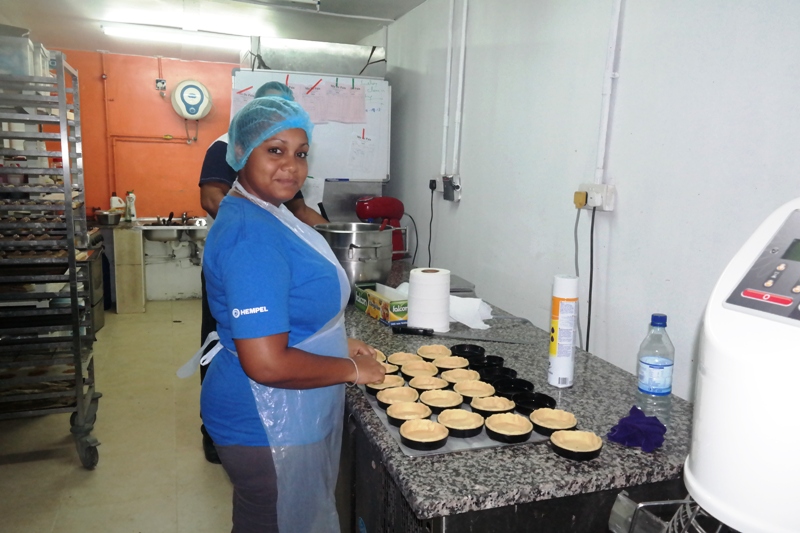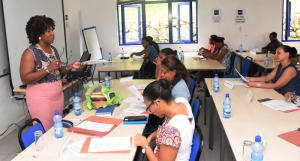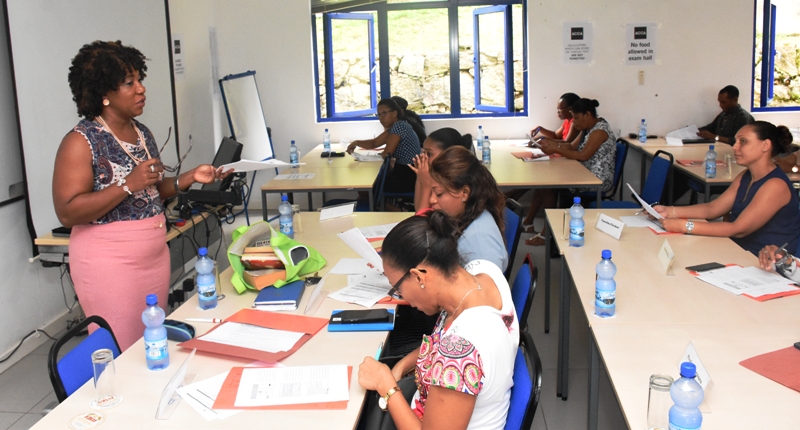Validation of National Labour Migration Policy
Validation workshop looks at national migration policy
30-November-2018

Present were stakeholders from the health, business, tourism and financial sectors as well as from trade unions and recruitment agencies.
The half-day workshop was held at the SITE auditorium and was kicked off by opening remarks from the International Labour Organisation’s (ILO) assistant director general and regional director for Africa Cynthia Samuel-Olonjuwon and the principal secretary for employment Jules Baker.
The Seychelles National Labour Migration Policy is a comprehensive policy which incorporates all previous policies together for a more cohesive approach to the flow of migrant workers in the country.
It has been conceptualised in line with the international standards and recommendations set by the ILO and the conventions signed by Seychelles.
Vanessa Dugasse, the director of labour migration at the department of employment, describes a migrant worker as any foreign person who comes to Seychelles to work for a set period of time which can be extended.
She explains that the policy has been in the works for over four years and stressed that incidents concerning migrant workers over the past few months have not been the catalyst to the finalisation of this policy.
However Ms Dugasse acknowledged that these unfortunate incidents have played a role in boosting public support as well as that from politicians and the private sector towards the realisation of the policy.
The policy is meant to contribute to the long-term vision of sustainable development for the country by enhancing the benefits of labour migration and minimising its negative impacts for the country’s economy, society as well as for the migrants themselves.
The policy’s key objectives include:
- Effective governance of labour migration through policy coherence between ministries, coherent legislative and regulatory frameworks as well as the establishment of solid bilateral relationships with countries of origins of migrant workers.
- The protection of the rights of all workers.
- Attracting, retaining and developing skills
- Fair and effective recruitment
It has been established that Seychelles has experienced a significant rise in the in-flows of migrant workers and they now represent one-third of the country’s workforce -- the numbers stood at 21,000 at the end of August 2018.
Their contribution to the development of the economy has been undeniable and they have filled the gaps where Seychellois workers have not been able to.
But their presence have also brought forth certain challenges for the country such as poor working conditions of migrant workers and abuse of the certificate of entitlement or other employment policies where Seychellois workers are overlooked in favour of foreigners.
“What happened in Seychelles is that we developed so fast that we could not anticipate the pace or the number of migrant workers we would need. Now we are trying to catch up and this is why we are implanting these programmes,” Ms Dugasse explained.
She added that certain elements of the Seychelles National Labour Policy will need to be regulated in order to be effectively enforced and Ms Dugasse said that this will come in due time.
Upon completion of the validation process, the policy will be sent to the Cabinet of Ministers for approval after which it will be implemented.
“We are expecting that this policy will come into effect by January or latest February next year,” Ms Dugasse stated.
Complements of Seychelles NATION.
STAKEHOLDERS GET ACQUAINTED WITH NEW DECENT WORK COUNTRY PROGRAMME
Stakeholders get acquainted with new decent work country programme
27-November-2018
Key stakeholders have embarked on a two-day capacity building workshop to get better acquainted with the new Seychelles Decent Work Country Programme 2019-2023.
The workshop is being hosted by the Ministry of Employment, Immigration and Civil Status and facilitated by the International Labour Organisation (ILO).
It was officially launched yesterday at the Savoy Resort & Spa by the principal secretary for employment, Jules Baker.
The workshop’s objective is to prepare government officials, representatives from the private sector and other relevant stakeholders in the implementation of the programme which will officially be signed and launched tomorrow.
The Seychelles Decent Work Country Programme (SDWCP) 2019-2023 is the country’s second generation of such programme.
The first SDWCP was signed in 2011 and came to an end in 2015.
The decent work is a concept of the ILO based on the understanding that work is a source of personal dignity, family stability, peace in the community, democracies that deliver for people and economic growth that expands opportunities for productive jobs and enterprise development.
During his opening remarks PS Baker noted that the decent work programme is of great importance to the promotion of national development and in the implementation of national and international frameworks.
“Much has been achieved in the first decent work programme for Seychelles 2011-2015 which was extended into 2017 in our quest to provide the best possible livelihood for our working people,” PS Baker stated.
He however added that the first SDWCP had faced various challenges in its implementation which they hope to remediate in the implementation of the second SDWCP.
“With the launch of the new SDWCP, I see great promising prospects for Seychelles. The challenge will be in the implementation of the various projects under the decent work programme.”
Due to the fact that employment issues cut across all sectors the programme will necessitate joint actions to be undertaken by all of these sectors, PS Baker added.
“Focus will be placed on delivering results that could positively impact on people’s lives and I am sure that with the help of the ILO you will be exposed with the necessary knowledge towards the successful implementation of the second generation of the decent work programme for 2019-2023,” PS Baker told the participants.
Redha Amaeur, the regional specialist on HIV and Aids at the ILO, also made note of various mistakes in the implementation of decent work programmes in various countries adding that the ILO is learning from those mistakes.
“Moving from the concept to the implementation has been more difficult than we imagined, not only in Seychelles but in other countries so we ended up agreeing to spend more time and resources, and to make sure we answer the questions you have on the decent work programme.”
Mr Amaeur further stated that the implementation of the decent work programme relies mainly on three elements: having the right understanding of the decent work programme, ensuring the division of labour to know who is working on what and effective coordination.
Susan Morel, technical advisor at the department, also gave an in-depth presentation on the SDWCP 2019-2023 which includes three key national priorities.
These are the creation of decent and productive employment, strengthening of social dialogue and tripartite institutions and the effective implementation of the international labour standards.
The workshop concludes today and will be followed tomorrow by the signing of the memorandum of understanding by the government, social partner and the ILO on the SDCW 2.
Complements of Seychelles NATION
82 RE-SKILLED YOUNG PEOPLE RECEIVE CERTIFICATE, JOIN THE WORLD OF WORK
82 Re-skilled young people receive certificate, join the world of work
82 young people aged between 18 and 30 or more have received their certificates after having successfully completed
training in different fields under the department of employment’s Skills Development Programme (SDP) .
The 7th employment training scheme certificate presentation ceremony took place at the ICCS on Friday afternoon in the presence of the Minister for Employment, Immigration and Civil Status Myriam Telemaque, key officials from the same ministry, representatives of different organisations which welcome the young people for training, their parents, among other guests.
It was a moving ceremony punctuated by testimonies of different young people who shared their journey through the training programme, highlighting the difficulties they encountered in their effort to secure employment while having no skills.
“It was not easy at all after I dropped out one year into the bar and restaurant course I was following at the Seychelles Tourism Academy,” 19-year-old Shamira Padayachy remarked.
She cited difficulties while on attachment as the reason for dropping out.
She encouraged other young people facing the same predicament not to feel discouraged by any challenges in life but to seize the opportunity to retrain in another field and move on in life. As for her, she retrained under the SDP and has become an office assistant.
32-year-old Manette Jeanne, originally from La Digue, also shared her story, noting that she started as a carer but after a very difficult journey enrolled on the programme and has now gained the skills in hairdressing and hoping to return to her native island to open her own salon.
18-year-old Dyan Daro was not keen on following any training at any professional centre after completing his secondary education at English River in spite of all the encouragement to do so.
“I just wanted to work as a cook so I enrolled on the programme and was attached to the Fisherman’s Cove Hotel and I am very happy that today I am employed at the hotel as a commie chef and I do pastry, as well as the hot and cold dishes,” he said proudly.
When she addressed the group of young people, their parents and other guests, Letimie Dookley, the director general for employment promotion, congratulated the group for having successfully completed their on-the-job training.
She noted that from January 2017 to date a total of 355 young people were placed on the training programme and from that 82 have successfully completed their training and have secured employment. 98 trainees unfortunately dropped out but a total of 175 are still following the programme.
“These are satisfactory results noting that each placement differs in duration hence it would be imperative to establish how far the participants progress in their respective jobs and on the labour market in general after completing the programme,” Ms Dookley remarked.
“I am certain that the journey leading to the special occasion today has been marked with a lot of sacrifices and also dedication and we are proud of you and your achievements,” stated Ms Dookley.
She also acknowledged the commitment and patience of the different mentors who have worked alongside the young people.
“This ceremony testifies that all your hard work has brought great results and I encourage you to continue to support our youth,” Ms Dookley said.
“I am certain that the journey leading to the special occasion today has been marked with a lot of sacrifices and also dedication and we are proud of you and your achievements,” stated Ms Dookley.
During Friday’s ceremony different organisations who opened their doors to receive the young people for work attachment were also recognised and they were presented with a certificate by Minister Telemaque.
They were Scenic Landscaping, Planning Authority, IOT, Pillay R Group, Maven Pty LTD, International School, Registration Dept., SPTC, Ascent Projects, and Coco de Mer Hotel.
Ms Dookley has called on other organisations to come forward and give a helping hand as well as to continue encouraging our youth to train to join the labour market.
Complements of Seychelles NATION.
Employment Department Satisfied with URS
Employment Department Satisfied with URS

URS was introduced this year for four specific target groups including people who are dependent on social welfare, ex- convicts, people living with disabilities as well as those on the methadone or detox programme and aims to place them in full-time employment to reduce dependency on social welfare and other financial assistance.
According to the director for special employment programme, Letimie Dookley, the programme was intended as a pilot in four districts, but the employment department decided to expand on account of high demand from district administrators and members of the National Assembly (MNAs).
Between January and October, the department has registered a total of 1936 participants suggested to them by the welfare department, one of the many partners that the department collaborates with for the programme.
Of the 1936 participants, 485 are youths aged between 15-24 years old.
“360 are already employed on a full-time basis so they are no longer dependent on welfare. Out of those, 88 are aged between 15-24 years old and we also have 174 participants actively on the programme who are either working or gaining training,” Miss Dookley remarked.
She added that the department is satisfied with the results that the programme is yielding and that they will continue to assist people to gain employment for their own benefit and especially for the benefit of their families.
“We do not simply register people to put them into employment but we also take them on to training programmes and others that will help them to up their skills and make them employable so we can ensure that those who really want to work do get jobs,” she continued.
The Ministry of Employment, who administers the programme, collaborates with the Agency for Social Protection (ASP) and the Department for Poverty Alleviation to identify participants for the programme. Payments are made by the ASP on a weekly or monthly basis although Miss Dookley says that participants are encouraged to collect their salaries on a monthly basis.
Monitoring of the individual participant is conducted through having an attendance book placed at their place of employment to be signed by the participant and superiors. The department then considers this on a weekly basis and communicates the relevant information to ASP.
In terms of what kind of jobs the participants are placed in, Miss Dookley revealed that 94 private employers are registered with URS although the majority of positions are vacant at government departments and agencies.
“Many are working at district administration offices and others working with agencies such as Seychelles National Parks Authority (SNPA) to clean and maintain trails. They are engaged mostly with community work but we have other jobs and these positions are helping them to develop their skills,” said Miss Dookley.
Miss Dookley also stated that one of the major challenges faced by the department is that the target group may not necessarily want to be employed and thus do not cooperate when called in.
Furthermore, they may not necessarily have required qualifications and skills for the types of jobs that they want or many of them want employment on a casual basis.
Upon the request of the Department of Poverty Alleviation, the employment department also conducted door-to-door surveys in five districts, namely, Corgat Estate located in Mont Fleuri, Les Mamelles, Roche Caiman, Plaisance and Perseverance between April and October whereby 319 people who are unemployed were identified. Between April and October, 106 people have already been placed in work places with around 60 of them still unemployed while the rest are either awaiting response from interviews and awaiting interviews.
Validation Process of the Radiation Safety and Security Regulations 2018 Starts
Validation process of the Radiation Safety and Security Regulations 2018 starts

The Ministry of Employment, Immigration and Civil Status in collaboration with the International Atomic Energy Agency (IAEA) is in the process of validating the draft Radiation Safety and Security Regulations 2018.
As part of the validation process, the IAEA expert, Trevor Boal, came to Seychelles to participate in the review of the draft regulations and provide technical support to the discussions with stakeholders.
His meeting with the technical team which participated in the drafting of the Regulations on October 22 and 23, 2018 was to discuss the different parts of the regulations and on October 25 and 26 to discuss the comments brought forward by the stakeholders during the validation workshop on Wednesday October 24.
Mr Boal worked for 15 years as a scientific officer with the regulatory body for Radiation Safety in the State of Victoria in Austria and for 17 years as a Regulatory Standards specialist at the IAEA. He was the technical officer responsible for coordinating the revision of the International Basic Safety Standard for Radiation Protection.
The main objective of this validation workshop of the draft Radiation Safety & Security Regulations is to ensure adequate protection and safety of workers and the general public in the acceptable use of radiation and radioactive materials.
Seychelles became a member of the IAEA in September 2002 and the Radiation Safety and Security Act, which is a statutory framework and national regulatory infrastructure in accordance with international standards, was assented in October 2014. As a member, we are obliged to introduce national law and regulations for the safety of sources of ionizing radiation, radiation protection, safe management of radioactive waste and the safe transportation of radioactive material.
The Ministry of Employment, Immigration and Civil Status as the Competent Authority, has among its various responsibilities to establish regulations governing radiation safety and security, enforce the radiation safety and security legislation in order to ensure the safe use of radioactive materials among importers and suppliers of radioactive equipment or sources, persons involved in radioactive activities such as medical and dental practices and those in possession of industrial radioactive equipment and laboratories in the country.
Seychelles Decent Work Country Programme 2019 to 2023 Set in Motion
Cabinet has approved the Seychelles Decent Work Country Programme 2019 to 2023 to be signed with the International Labour Organisation (ILO).
It is aimed at building on emerging challenges and lessons learnt from the first programme’s implementation 2011 -2015 and extended to 2017 for completion of targeted activities.
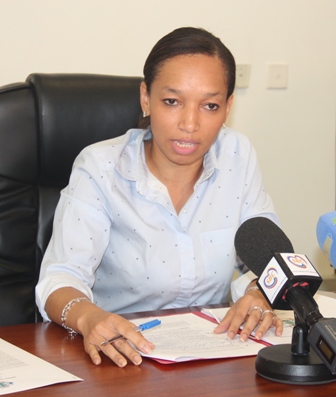
The programme entails three employment priorities to address challenges on the labour market. After consultations with stakeholders, relevant ministries, unions and employers the three priorities were identified. The first priority under the programme is the creation of decent employment; targeting people with difficulty to access employment, informal employment; targeting people who work casually without a working contract and also to study the labour market to provide government with statistics for better intervention on policies for the next five years.
The second priority concerns the social dialogue with all stakeholders to be more proactive in educating workers and to develop collective agreement for better working conditions across sectors.
The third priority is to effectively implement the ILO standards through enforcing laws on the rights, responsibilities and education of workers.
As explained by employment technical advisor, Susan Morel, all three relates to decent work which, according to ILO, involves opportunities for work that is productive and delivers a fair income, security in the workplace and social protection for families, better prospects for personal development and social integration, freedom for people to express their concerns, organise and participate in the decisions that affect their lives and equality of opportunity and treatment for all women and men.
Ms Morel said that it is expected people, especially the youths and women with children, will find it easier to access jobs and maintain their jobs while stakeholders play a more proactive role to advise government on better polices for the working environment.
It is hoped that the national labour laws are drafted in a way that is favourable to promote productivity among the workforce.
This Decent Work Country Programme was developed by ILO for under and semi developed countries where the working conditions were not up to international standards in terms of equality between men and women over pay, discrimination, equal pay for work of equal value, child workers, forced labour, among others. The programme is to prevent workers to be used as commodities for buying and selling on the labour market.
Co,pliments of Seychelles NATION.
Six-Month Ban Imposed on Recruitment of Bangladeshi Workers
SIX-MONTH BAN IMPOSED ON RECRUITMENT OF BANGLADESHI WORKERS
The Ministry of Employment, Immigration and Civil Status has imposed a six-month moratorium on the recruitment of expatriate workers from Bangladesh.
The moratorium, which came into effect yesterday and is expected to last up to April 2019, will prevent local employers from sourcing their employees from Bangladesh.
The moratorium also applies to prospective Bangladeshi investors, traders and business persons.
This announcement was made yesterday by the principal secretary for employment Jules Baker and principal secretary for immigration and civil status Alain Volcère.
Although there will be no new recruitments of Bangladeshi for the next six months, PS Volcère explained that the moratorium will not affect Bangladeshi currently working in Seychelles.
“We will be able to extend and renew their GOP (Gainful Occupation Permit) provided that their working conditions are in order,” PS Volcère stated.
It is to be noted that there are at present around 1724 Bangladeshis working in the country in various sectors such as security firms, agriculture and construction.
He further added that the moratorium will have no impact on the recruitments that are currently in the pipeline.
On his side, PS Baker explained that the moratorium is the direct result of various issues and challenges the ministry are facing in regards to Bangladeshi workers.
“This moratorium is due to the fact that we have recognised certain challenges being faced locally when it comes to recruitment. There a lot of Bangladeshis being recruited without proper control; they are unskilled, unqualified or do not meet the requirements,” PS Baker provided.
According to PS Baker, the moratorium’s objective is to ensure that proper procedures are put in place to control how Bangladeshi workers are recruited and formalise their working conditions.
To achieve this, the ministry has drafted a bilateral agreement that will be brought to the Bangladeshi government for its consideration during the six-month period.
Compliments of Seychelles NATION.
Labour Minister Commends Amalgamated Tobacco Company For Impressive Working Conditions Among Staff
LABOUR MINISTER COMMENDS AMALGAMATED TOBACCO COMPANY FOR IMPRESSIVE WORKING CONDITIONS AMONG STAFF
The only producer of tobacco products in the country, the Amalgamated Tobacco Company, received a visit from the Minister of Employment, Immigration and Civil Status, Mrs, Myriam Telemaque on Friday 5th of October 2018. This visit is in line with her plan to strengthen liaison and collaboration between her Ministry and private establishments employing workers.
The visit like all others of its kind is of a procedure beginning with a tour of the establishment’s premises and sections involving interaction with staff, after which the Minister meets with the management of the company in order to discuss observations made and exchange ideas.
During the tour of the factory, each and every worker expressed significant passion for their work, the favourable relationship they have with the management, the condition of the working environment and their genuine satisfaction with the company. The Minister, accompanied by officers, acknowledged that majority of the workers were long serving; 60% of the workers have been with the company for 20 years and above and are more than willing to stay longer. This exhibited an exemplary record and proof of effective good practices in place. As observed, the working environment is also properly equipped with the required safety measures and appropriate safety gear for the workers to use to undertake their daily tasks.
The debriefing with the management had no concerns raised, which is a rare occurrence. Indeed the Minister and her delegation were impressed with the prominent effort the management has put into the consistent smooth running of the company to achieve the balance of adequate employer-worker satisfaction. The Managing Director gave an insight into what they have in place to keep their workers content which includes incentives and benefits such as bus fares for convenient transportation to and from work, medical assistance for all workers and suitable uniform. The company also invests in training for the staff which empowers them to perform their duties better, the starting salary level which happens to be significantly above similar workplaces with a minimum of 4% yearly increase, the workers as well receive 3 yearly bonuses in March, September and December along with the 13th month salary. The management of the establishment organises social activities and occasional gifts for the workers as well as long serving staff recognition which is very important for staff retention. This methods of incentive also reflects on members of the management as they feel pleased with the effort and performance of their workers, this appreciation has equally gone a long way.
After the debriefing, the management took the opportunity of the visit to discuss some minor difficulties they are encountering in regards to the tax system that are somehow impacting on incentives they currently provide for their workers. The Managing Director asked for the Minister’s support in bringing their issues forward to Authorities concerned when she gets the chance for possible resolution.
The staff and management were of very cheerful gesture and appreciative of the visit. The Minister commended the management for their positive efforts that should be an example for others to follow. She encouraged the workers to maintain the positive balance as she also expressed confidence in the long term built relationship between the workers and the management.
Employment Minister Expresses support as she visits three employment establishments in the production sector.
For the month of September, one of the first visit that the Minister for Employment Immigration and Civil Status, accompanied by senior officers of her Ministry, undertook was to a private establishment well known for printing, design and publishing, The Print House, situated at the Providence. The visits are with the aim of enhancing the Minister’s plan to create and maintain a positive and collaborative relationship between her Ministry and working establishments.
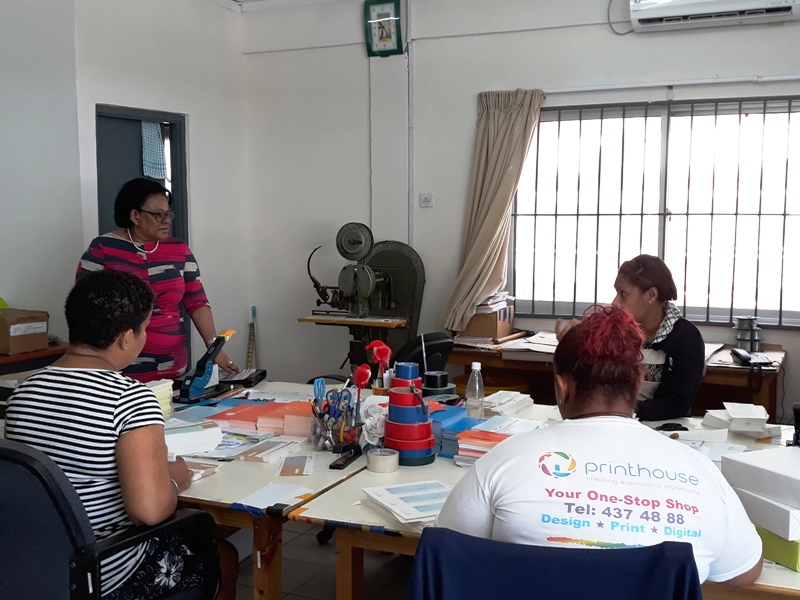
The visit maintained the same procedure as all ministerial visits which usually begins with a tour of the establishment’s premises and by so doing there is the opportunity to relate with the workers and have a feel of their daily tasks and working environment. After a tour of the vicinity, the Minister holds a discussion with the management of the company, during which their best practices are encouraged and suggestions for the issues raised by staff are proffered.
During this tour, the general impression communicated by the workers was one of passion for their job. In the absence of a General Manager, the human resource personnel proved to be effective as positive remarks were made describing the inclusive efforts and activities put together for the staff such as satisfactory salary and welfare events like gatherings for the staff birthdays. The establishment also retains the honour of long serving staff as well as managerial practices tailored to suit the nature and needs of the company like their staff overtime negotiation and appraisal system.
There were some issues raised, however few which were discussed such as the presence of a communication breach among staff of different sections that creates certain confusions when it comes to the work process to which the Minister suggested more frequent and consistent meetings and the sharing of feedback to staff after the meetings. Staff turnover were also brought out as a point of concern by staff that as a result is affecting others in view that the workload would increase but with no adjustment in remuneration or acknowledgement of efforts. On the part of the employer, there was the issue of work attitude and the reluctance to take up more responsibility even with the availability of training provided by the company.
By and large, the Minister expressed support to the workers urging them to be committed and steadfast in their duties and to the employer for their efforts in maintaining conducive working conditions for their staff.
The second visit was to Mie de Pain, a local bakery in the Providence industrial estate. The bakery is part of a larger company “Paint World”, through which most of their purchases and administration are controlled. Mie de Pain produces a vast variety of exquisite pastries which are sold at the front section of the bakery.
Prior to the tour of the premises, the Manager Mr Steve Jardine explained how the baking was done of which most was in the mornings and their process of purchasing and storage. The tour of the bakery showed an extensive improvement to the infrastructure from the previous visits by labour officers, while the staff at their work stations remarked on how they are now satisfied with the management and condition of work and salary. The company’s efforts to make the workers content did not go unnoticed with the provision of free sandwich for breakfast and lunch as well as birthday cakes whenever it was the occasion.
After the tour a brief meeting with the Manager was held as he expressed willingness to take in students who would like to learn or perfect their baking skills even if the working hours might be challenging as baking begins early as he stated, “it is not perfect here but we hope to improve”. The company also offers flexible working hours arrangement which should assist them in retaining staff and attract good quality ones.
The Minister encouraged the workers and expressed satisfaction in the working condition of the establishment and urged the company to continue to improve in order to get more people to join them.
The third and final visit for the month was to SODEPAK situated at Le Rocher, a company involved in water bottling for many years now. During the tour of the factory, active interaction ensued between the Minister and the workers as they depicted a general sense of satisfaction in their job. The company has staff with long years of service, some as long as 30 years and this has come as a result of good working conditions that the company keeps improving on over time. They have recently built a rather impressive and comfortable canteen with spacious sitting areas for the staff. The workers are provided with adequate safety gears as well as facilities for conducive work in the factory. However, some minor concerns were raised which included the shortage of staff in some sections and this intensifies tasks for the workers.
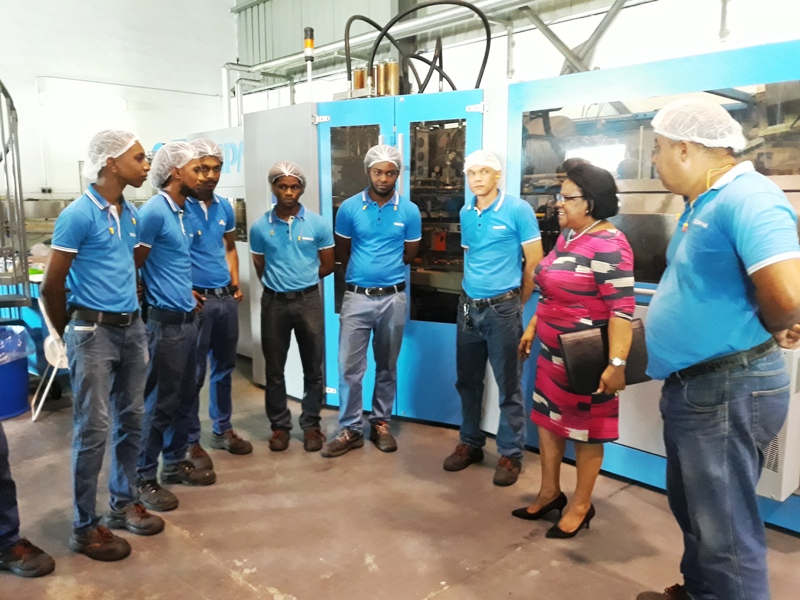
During the debriefing management made known of their plans to expand on their business by introducing new products that is imminent. They informed of the difficulties they face to recruit locals and that this is a concern for them as they continue to grow as a business. They hope that with the introduction of new technology that will happen soon will help ease on the intensity of the work thus attract more people to join them especially the youth. At the same time they will continue to provide opportunities for their current staff to grow alongside them by promoting those with potentials and provide new incentives to keep their retention rate high.
The Minister, on her part, commended management on the efforts being made to adhere to employment regulations as well as providing a conducive working environment for the staff as seen in the practice of flexible working hours for the mothers, also there are monetary incentives to increase performance and promote a culture of punctuality as well as to help tackle the situation of excessive sick leave. The management also operates an open door policy providing a channel for effective communication. She suggested that the company recruit a human resource personnel to help reduce the work load and organize the administration of staff as well as make provision for social activities. She also expressed satisfaction in the condition of the establishment-worker relationship.
There will be follow up on all three visits in due time by officers of the Ministry to ensure agreed recommendations are implemented within reasonable time.
Employment Department Hosts Workshop on Work/Life Balance at Guy Morel Institute
‘You are much more than your job’
In early 20th century some economists were of the opinion that our current generation would be working fewer hours than their forefathers and hence living a life of leisure.
However the realities of a 24-hour work culture, compounded by the effect of technological advances such as emails and smartphones, have made it challenging for workers to strike the right balance between their professional and personal lives.
In a bid to offset this trend, a group of human resource (HR) managers and officers from the public, parastatal and private sectors yesterday participated in a workshop to learn various strategies to maintain a good work/life balance.
The one-day workshop was organised by the Ministry of Employment, Immigration and Civil Status in collaboration with The Guy Morel Institute (TGMI).
Discussions were facilitated by the director of the Enterprise Centre at TGMI, Marie-Céline Zialor, and focused on identifying work/life imbalances, the essentials of work/life balance techniques, emotional intelligence skills and self management as well as work/life balance policies and strategies.
Maryvonne Francis, the head of the productivity unit at the employment department, said that the workshop forms part of activities organised in relation to the department’s National Productivity Strategic Plan for 2017-2021.
“More than ever, the subject of work/life balance is important and we have to promote this concept in places of employment,” Ms Francis highlighted.
Complements of Seychelles NATION.

